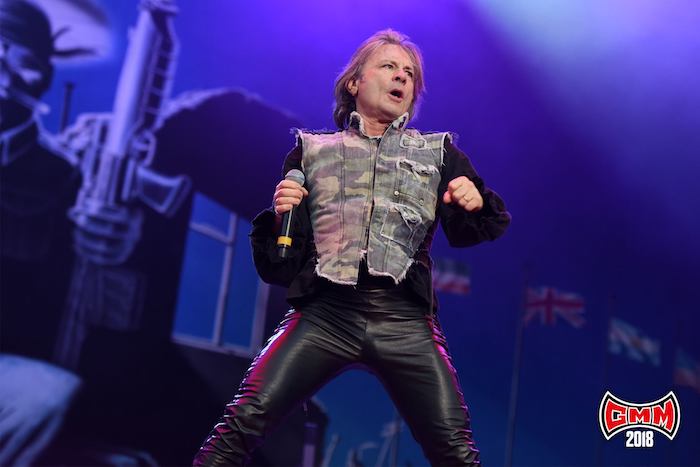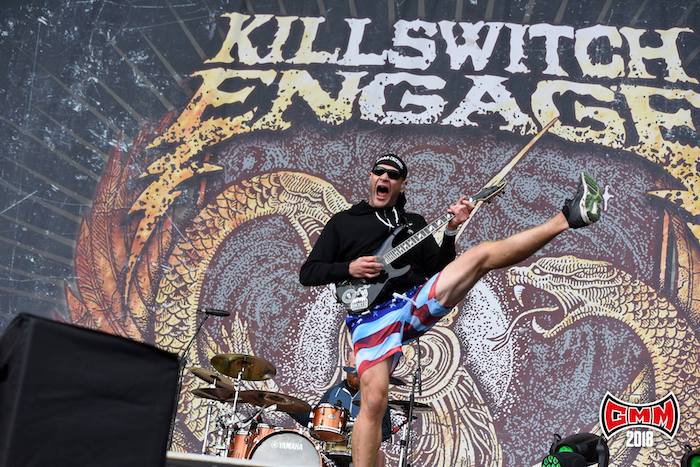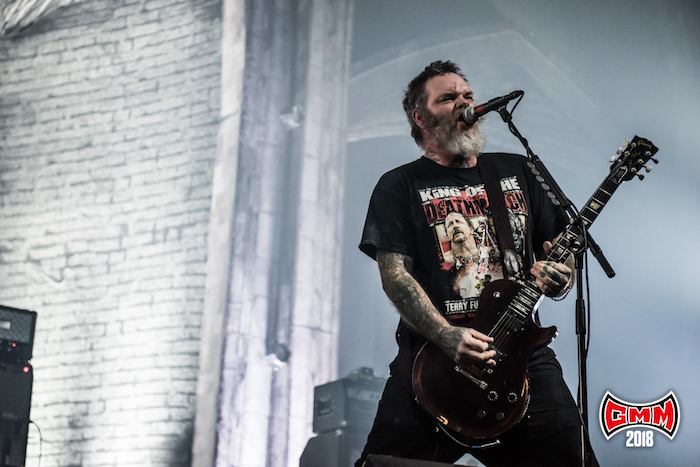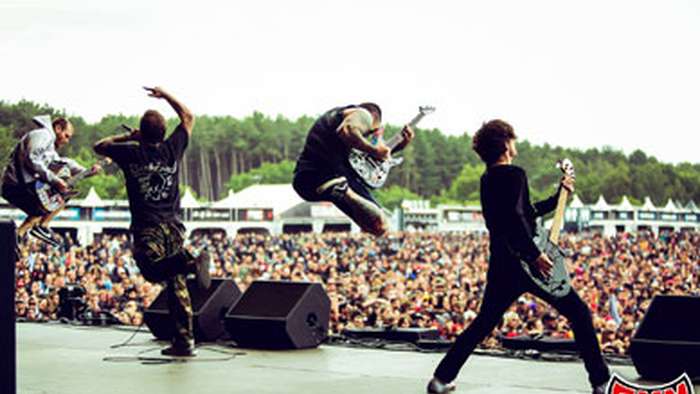The task of summing up a well-organized European festival is large enough, especially since I dislike festivals to begin with. So I’ll leave you with one day, and one interpretation, namely, my own. Whether you like music festivals or not shouldn’t send you running from fear of crowds, and social inhibition, or the shitty overpriced food, sweaty campsites, criminal lack of showers, bad sleep, and unpredictable weather. The typical festival reflects a fascinating psychic drama, acted out in real life between animalistic instincts and lofty spirituality through the mouthpiece of civilizing humanity; and, I argue, music festivals foster the best attitude to experience this drama outside a dogmatic religion. The fact Graspop is a metal festival gives this experience a particular twist of anti-authority, and antitheism, weaving through the fabric of band t-shirts, jean jackets, patches, and studded boots.
In reality I expected more of these studded jackets, along with neckbeards, and drunken fistfights. I guess a little bit of North American expectation seeped in to my attitude. People here look more like weekend warriors. They spent the first half of the year waiting patiently for festival season to kick back, get fucked up, smoke some weed, and enjoy the good tunes in nice weather. The most common merchandise I saw were staples of metal: Iron Maiden, Black Sabbath, Metallica, Slayer, Megadeth—artists that might roll the jaded fans eyes. These elitists look at die-hard fans with skeptical eyes, assuming their allegiance is shallow, and attached to a mentality that good music stopped in 1987. Conversely, the typical die-hard is ones who usually gets piss-yourself-drunk during the day, listening to whatever—grinning, bobbing, waiting until the headliner on one of the two mainstages takes control of their weakened inhibitions. True to type, the typical elitist finds solace in the obscurest artist, and inflates their musical tastes as universally “good” without paying due respect to metal “gods”. You’ll find these creatures lurking behind the rabble, standing on their toes, dead center to look at the band. They seek to experience the best sound quality, avoiding getting doused in beer by a stray “particle,” crashing about in mindless stupidity. This elitist, as a careful observer, often clashes with the die-hard at the front of the stage; both want to feel the music pulsating through their chest, but the elitist prefers to witness the magic of performance up close, and take mental notes (for more often these careful observers are musicians themselves), and the die-hard wants to meld their body with others in a overwhelming oneness of experience. Both act out a weirdly modern mystical experience, only one approaches it from a purely spiritual intellectual way, while the other, in a messy sensual way.

Iron Maiden
In terms of the kinds of bands at Graspop, the line up is perfectly diverse. Festivals like this are made for area bands like Iron Maiden, who easily have the biggest draw, play the longest, and deliver in every respect. Bruce’s voice was impeccable. It was awe inspiring to see that Iron Maiden still deserves their reputation. Occupying the middle rungs of the arena bands are Avenged Sevenfold, Killswitch Engage, Stick to Your Guns (the hardcore outliers among this group), and others. Occasionally the festival sucks up an odd outsider phenome like Culture Abuse, or a band like Less Than Jake, who’ve been slogging it out for too long to ignore. The rest of the festival tries to represent the new developments of black metal, technical death metal, and the metal heads interpretation of what punk still is (cough, cough, Silverstein). Now arena metal isn’t necessarily bad, but it usually takes a while for the truly good bands to reach mass appeal. It takes time for Audience to catch up, and pick up what had been thrown down 10 years ago.
Other than playing in the key of metal, and it’s daughter genres, fans flocked here with three-fold forces drawing them from all over Europe, and the world to Dessel, Belgium, for a metal “meeting”. One of such pieces of connective tissue is the ritual beer festival. It’s the same reversal of roles found in Christian carnival (featured in most Catholic populations), Mardi Gras, Oktober Fest, and New Years celebrations, no more intelligible than what a Christmas tree means, but immediately understood.
With all these weirdoes running around—and yes they’re weird—I found myself thinking, “thank god they have metal!” Alpha maleness is shunted aside for fashion and “good” taste. Your competence and devotion to right bands determines your success in the hierarchy, rather than personality. This development makes sense, but it produces some pretty neglectfully tubby bodies, uncontrollable blinkers, and questionably uncomfortable fashion choices. But there’s more to acting in the world than having passion, and knowledge in your interests. You need to communicate, get along with individuals and groups, and carry yourself in a respectable way. Of course alcohol steps it’s sticky sweet toes in the mix as a proven social lubricant, enabling any socially anxious fans the courage to maintain eye contact, and enjoy themselves. Thus, the mysterious unity of beer and music—much like the mystery of bunny chocolate, and Christ’s resurrection—allowed a kind of half aware social unity.

Culture Abuse
Even though Culture Abuse is fundamentally a hardcore punk band, they embrace the reckless righteous-times attitude supporting the whole build up and experience of the festival. They came out with some feel good beats, angsty yells, and whips of aggression amid the vocalist’s stumbling and silly grins. Granted he has cerebral palsy, the fact he came out and dumped beer on his head confirmed he was drinking a bit (or at least wanted to look that way). The security guards were more into the music, half mockingly exaggerating the crowds timidity. To be fair, this was day two, and it was 1-o’clock in the afternoon—not the best time slot at a festival. Nevertheless, they set the mood quite well for the majority of people looking for an alcoholic release from their hangovers, and the freshmen looking to join them in a day’s time.
The sheer frequency of drink stations, and the layer upon layer of crushed beer cups speaks—no, yells drunkenly—how universal and inseparable alcohol was from the whole experience. Six hours after Culture Abuse, Adam Dutkiewicz, of Killswitch Engage, yells, “who like’s beer!?” in his tiny shorts, (and, frankly, very nice legs). A massive cheer erupted and confirmed: everyone, apparently. Even the stoic losers on the ground, ass to the grass, throwing up in their shoes, lifted a lazy devil horns in approval. And then Killswitch Engage blew the roof off (which is impressive because the festival was outdoors!) They were by far the tightest band, and Jesse’s voice was primal and powerful.

Killswitch Engage
Back at the Juplier stage, named after the Belgian piss-beer (pronounce it like your drunk and you got it!), the obvious granddaddies of Culture Abuse, Less Than Jake, popped by for a bouncing good time. Crowd surfing ruled their set. Even the security guards joined in. Clearly they kept the good vibes going as the sun set. The crowd loved them, and so did I. Never had I smiled that much the whole day.
Well that’s not true. I was grinning like a foreign cousin when I saw a guy get head-butted. He accidentally knocked a sleeping giant off his hammock, goofing off with his friend. After the headbutt, they squared off but the giant backed down and fell back into his slumber. But our hero went back for redemption (round two: fight!) He knocked him off again, intentionally, and ran away, tempting the beast form a safe distance of 30 feet for a few minutes, shoeless, with a broken ego, and new confidence in tipsy inspiration. Maybe the moniker asshole fits better than hero. (Have you ever spent your sober time with the too-drunk? It’s like their expression confirms that everything they look at is viewed with life or death importance, a kind of stupid fear in slow motion.)

Less Than Jake
Amid all the sophisticated music, why the juxtaposition of barbaric drunkenness? German-Swiss psychologist Carl Jung once saliently pointed out, “even the most enlightened of us will set up a Christmas tree for his children without having the least idea what this custom means.” Much the same is acted out at Graspop with alcohol in so many questionable jests. Sheer madness in shameless frenzy possessed festivalgoers as they ate their greasy food from all corners of Stenehei. They burned a stinking grass made of tobacco and marijuana, ran and hopped about the trampled fields. “The older level of consciousness could let itself rip on this happy occasion” with the unrestrained wildness of paganism, harkening back, from our religious brain, to our animal instinct.
Similarly, middle age religious festivals often degenerated into orgies, ass-, and fools-festivals in the 14th and 15th century, a tendency bizarre and contradictory, often at the behest of an alcoholic haze. It is no wonder that the term spirit was named after a substance still thought to possess the user with ambivalent (and often malevolent) pagan gods. Alcohol is one substance that turns material ingestion into psychic changes, opening up the user to either spiritual enlightenment, or demonic possession. That the popularity of both alcohol and festival speaks at the most great importance, and at the least stubborn amusement—for a given culture reaches its sensual apotheosis in the music festival, conjuring Rabelaisian humor, sensual amusement, and a host of archaic instincts once of great use to primitive man—then it also has increasingly lost its potency and relevance to modern civilization. Yet the festival remains more popular than ever under different names, Graspop Metal Meeting is one among many.
These instincts developed over thousands of years before the dawn of ego-consciousness, and its ‘will.’ They can be said to have a life of their own, and often run contrary to the development of consciousness. Instincts take hold of both elitist, and die-hard when the former has the desire to escape the earlier condition of the past, and the latter revels in nostalgia for the past. (Of course the average person occupies, to varying degrees, both attitudes). Nevertheless, consciousness and increasing awareness has somehow escaped our animalistic past, and continues to deny its reality until possession rears its sweaty head into our festivals, and social gatherings. In his book The World of Primitive Man, Paul Radin says, “it might be contended that the history of civilization is largely the account of the attempts of man to forget his transformation from an animal into a human being.” So interestingly, the festival brings out the low intellectual and moral level of humanity before the eyes of the more highly developed individual, so that he shall not forget our unconscious roots, as we drag them behind like a “senseless appendage.”
Jung finishes by saying, “It is really astonishing to see how many so-called superstitions are rampant nowadays in town and country alike, but if one took hold of the individual and asked him, loudly and clearly, ‘Do you believe in ghosts? in witches? in spells and magic?’ he would deny it indignantly. But in secret he is all for it, like the jungle-dweller.” As much as we like to think we’ve escaped our superstitious past, lost in the failed behaviors of primitives, we clearly hold the festival closely to keep the enemy close, so that he doesn’t get behind us. For in humanity “nothing is ever lost, not even the blood pact with the devil.”
For those of us wanting for more control of our consciousness, and maybe even a little afraid of letting loose, we wander the grounds, like sweaty sunburnt pilgrims, searching for comfort in what we know, and revelation in what we discover.
Another essential ligament of Graspop is the obsession over the technical aspects of music. The musically driven individual worships in the most secular of ways, i.e. in the mastery of instruments, and the most earthly accessible bands, more accomplished in marketability than inventiveness.

Avenged Sevenfold
Avenged Sevenfold takes the stage, touting cool-dudism, something like anti-Sufism with sunglasses, and an annoying voice. Synyster Gates was wearing a nice shirt and three necklaces (three!). What is this? A born again Buddhist? Or did he pull a George Harrison, and now worships Krishna? Avenged Sevenfold are like that one friend you know would turn into a complete douchebag if you let him. He needs the brutal corrections of his friends to steer him straight. And we know the joke about steers and queers. Alright! Get your mind out of the gutter. All I am saying is somebody should get out the scissors and snip Avenged Sevenfold’s top knot so they can make some “good” music. After three songs the vocalist had to go full vocal fry on the high notes to disguise his vocal nodes. Poor guy.

Akercocke
At the same time A7X was playing, Akercocke, a band I never heard of, were bizarrely floating between different styles of metal in the marquee. It was a cool smorgasbord of style, but ultimately left me feeling weirdly unsatisfied. The obvious high esteem these guys had for more extreme subgenres lured me in just to find out what the hell they were playing. It was like a Jewish mystic mediating on the various combination of the bible. Instead of Hebraic letters, it was blistering riffs, odd time signatures, and even odder chords.
Back again to the mainstage, on the massive screen I see a “Drug Free” sticker on a guitar, and a camo-clad frat boy swinging his arms to a fro. It’s been a while since I had seen them play in my hometown. Back in the old folks community center, Stick To Your Guns knocked it out of the park. It seems they went from disturbing the elderly in small Canadian towns to mainstaging festivals in small European towns. Back in Canada it was clear Stick to your Guns had the right amount of schmooze (bass drops, breakdowns, sing alongs and halftimes) to appeal to a large crowd. Banal chants sung seemingly for the purpose of putting them on the back of t-shirts, plus the “being different posturing”, good licks, bang on energy, and excellent drummer makes them like a hardcore Killswitch Engage. Of course their consistency means they’re acting true to type, as well as possessing undeniable integrity.

The Darkness
After a well-needed nap in my tent, I stumbled back to the Metal Dome where The Darkness was “playing.” I was struck with the sudden realization: I don’t give a shit about The Darkness. I mean, give me a break. I’d rather listen to that “two in the pink, one in the stink” band. The lead vocalist was wearing shiny tight pants and a matching open blazer with nothing underneath showing off his torso. At least he is working out… Nice!
Uniting these middle range acts is a kind of religious devotion that denies spirituality. Instead of dogma they worship themselves, as is the case of Avenged Sevenfold, and The Darkness; or metal itself and its manifold faces, exhibited in Akercocke; or the kind of secular sober truth Stick To Your Guns invariably places all bets on, as if black and white were the rainbow. Although, If we follow this sober second thought, we discover inside most metal bands the need for spirituality outside outright religious language. And when it is not connected with a higher ideal, it often counts down to degeneration, senseless masturbation, and marketable filler.
Likewise, accusing a predominately atheistic community of acting religiously likely will infuriate not only the average fan, but also some of the bands I admire. As much as they would like to deny it, metal tolerates this religious imagery only if it is criticized, and inverted in black metal, or other “blackened” genres with the embrace of satanic imagery. In all other areas it is secularized, which is why Graspop is a Metal Meeting, and not a metal festival. For “festival” approaches a kind of religious authority metal is downright hostile toward, despite its behavior. Even the long trek from the buss stop to the “meeting” grounds was a pilgrimage to the holy grounds of Stenehei. The Metal Dome stage itself was decorated like an unholy church, where a good section of the black metal bands played in characteristic irony.
If Culture Abuse set the hedonistic mood for the festival, then Zeal and Ardor primed me for its opposite, spiritual side. They took the stage oozing damn fine soul mixed with heavy goodness. This combination surprised me, pulled me in, and got a stellar reaction from the crowd. At one point the lead vocalist, rendered speechless from the voluminous cheer, said, “Oh fuck.” They had two back up singers, just as talented as the frontman, yelling in layered patterns of metal harmony. Chanting “The Devil is fine” in amazing call and response, dramatic stage presence, and portentously dark aesthetic, Zeal and Ardor were like Hozier with balls, and the crowd were clearly hungry for it.
Watain’s anti-god complex and a taste for leather, corpse paint, and fire, contrasted The Darkness’s shiny bedazzled antics of frivolity. Blood filled cups spill onto the audience, as the trident props bonfire satanic warmth on the breezy overcast day. Once again audience couldn’t drink enough from their cups. They were thankful to the warmth these anti-christ’s were giving them. Watain was like The Darkness with better music, and just as over the top in their image. They are The Not-Darkness Darkness. Maybe the two should switch names.

Wolves in the Throne Room
Occupying the healthy middle between dramatic antics, and satanic goodness, was Wolves in the Throne Room, with their pagan imagery: the first band of the evening that left me inspired. They were bigger than big, unbelievable, with unapologetically long songs. Their goodness even made up for the fact the lead singer was wearing enough eyeliner for 3 stereotypical crack whores. During their last song the guitarist lit incense and began making circles, blowing the scent into the crowd. It gave a smell to the music; something of a complete mastery of the environment, prepping the very air the music reverberated through. The more control a band has of the audiences senses the better. It amounts to the control of the uncontrollable. Imagine a room with blank walls, infinitely complex upon closer examination. An individual comes in and turns on a projector that flings a series of four images on each wall blending in to its warps and pits. Projecting images more or less on a human scale, which lines up a series of self-created patterns not detectable before, but immediately recognizable now, in their unity. This self-created 3-dimensional image is viewed from the inside, thereby unintelligible from the point of view of consciousness, but inherently meaningful to the unconscious visual system that mysteriously attaches itself to the patterns. By analogy, this is how we experience music, in its mystical mystery, only in 4-dimensions instead of 3. And I don’t find it a coincidence that the most powerful bands of the day were the most outwardly spiritual.
Another way Wolves in the Throne Room mastered the room was how their bass rattled my chest. I could feel it in my bones: the area where the soul, and heart were once thought to live. The sound pierced the air so loud it could not be avoided, nothing short of inducing meditation. A miracle. The dethronement of god to the depths of nature (a characteristic satanic image) left us searching for base, earthy reverberations in the soul of man. Once in the domain of heavens our soul followed suit, lying below the brain of consciousness, and now rumbles in the chest of pure animal earthiness. That’s why Wolves in The Throne Rooms pagan imagery went well with the Metal Domes church decorations. Something religious is missing, and certain artists are searching for it, and a select few may have found something worth preserving in the controlled paganisms of the past: an antidote to the present.

Neurosis
Neurosis on the other hand forgoes the imagery in their music, so it can speak for itself. There was a palpable tension when they were setting up during sound check. (Yes, one of the most revered bands in music still does their own set up, sound check, and take down.) They were impatient with the sound guy; they never smiled, remaining focused, terse and tense: professional. They were not nervous, no, but acted like the importance that smooth execution was priority over niceties. Their job was to set up the necessary conditions and channel the spirit. This spirit guided them to create a musical structure within which it could manifest in the real world. Instead of relying on the visuals to do the work, and, inevitably, taint the music, they chose turned off the projectors, and bottled their potential up in specific ritual ways. As each song volcanoed through the 5-fold musical organism called Neurosis, unavoidably leaks of steam burst out in little subtle ways of passive and active aggression. It speaks to the careful effort Neurosis put in to their music to say, despite the minimal attention paid to theatrics, they outclassed every band mentioned with ease. I respect them more than I already did. They truly blew me away, and represented the climax of the evening. Now the denouement of drunken screams through the night!
This contradictorily spiritual attitude, touted by some, ignored by others, permeating among the festival in it’s entirety, represents the other half of a psychic drama of both elitist and die-hard; and also completes the final ligament holding Graspop Metal Meeting together as a hidden force. The polarity of spiritual worship and drunken primitive bawdry created a tension that gave life to the festival. If I hate the spiritual part, then I am possessed by my animal instinct in weak consciousness. If I hate the drunkenness, then I need to let loose, alcohol being one way, the transcendence of good music a sober alternative. But since alcohol is a more material and sure-fire way of loosening inhibitions, it makes perfect lubricant for a transcendental experience, even if it runs risk of bring out a barbaric animal past. And it’s this foolish bumbling that man needed to develop his consciousness and allowed civilization to dawn amid bloodshed. For civilization is a controlling of collective instincts in a conservative and moral way, second only to religion, linking civilization to religions on a continuum.
Graspop is another modern phenomenon where man is unable to separate his psychic historical drama with ritualistic gatherings. If he were to internalize it and use booze as the “stuff” that loosens his conscious inhibition, he could let the healing power of music guide him safely through the realm of ideas, impulses, and instincts, like a modern Shaman, without being possessed completely by our more brutal patterns of instinctual behavior. Instead his waking-sleep prevents him from integrating the whole experience into any kind of sense, and he’s left with a hang over, and vague ideas of the good time he thinks he had.
Thus the living effect of my experience, when a higher consciousness, rejoicing in its freedom and independence, is confronted by the inescapable autonomy of primitive instincts it must honor in overwhelming fascination, results in a kind of meaningful religious experience, despite my theistic denials that risked losing the festivals true potency.







